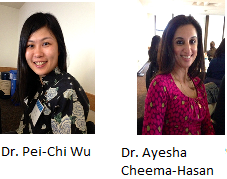Autism Research in Teens Utilizing the Rhode Island Statewide Autism Registry
April 1, 2015

|
Evaluation of PROMIS Self Report for Peer Relationship and Psychological Distress in Teens with High Functioning Autism Spectrum Disorders
Autism Spectrum Disorder (ASD) affects as many as 1 in 68 children. Despite the fact that ASD is this common, there are no widely accepted way to measure the outcome of medical care or educational interventions for children and youth with ASD. In particular, patient reported outcomes are needed. The NIH has developed the Patient Reported Outcome Measurement Information System (PROMIS) to provide tools for assessments in children and adults with many medical concerns, but they have not been used for or validated in children and youth with ASD.
Dr. Ayesha Cheema-Hasan, a 2nd year Developmental Behavioral Pediatric (DBP) fellow at Brown University/Hasbro Children's Hospital, is conducting a study to test whether the PROMIS Pediatric Peer Relationships and Psychological Distress Response surveys are accurate and valid measures for self report assessment in youth with high functioning ASDs. She also seeks to understand whether these youth find that the PROMIS measures accurately assess the constructs of Peer Relationships and Psychological Distress for them.
Dr. Cheema-Hasan plans to utilize the Rhode Island Consortium for Autism Research and Treatment (RI-CART) registry to find 100 youth with high functioning ASD between 12-17 years of age and their parents who are interested in participating in her study. RI-CART is composed of a wide array of individuals, including psychologists and parents, nurses and teachers, speech pathologists and psychiatrists, pediatricians, neurologists, scientists and researchers working tirelessly to help people with ASDs in Rhode Island and neighboring states. Its mission is to improve the lives of individuals with autism spectrum disorders by promoting collaborative, cutting-edge research, improving health care and support services, and providing data-driven education and advocacy.
Eligible youth will be those enrolled in RI-CART who have completed a Module 3 or 4 of the Autism Diagnostic Observation Schedule-2nd Edition (ADOS -2). Dr. Pei-Chi Wu, DBP faculty member at Brown University/Hasbro Children's Hospital and a former fellow in the program, is mentoring Dr. Cheema-Hasan in this work. RI-CART has enrolled over 600 participants to date, with over 100 of these between the ages of 11 and 17 years and having completed Module 3 or 4 of the ADOS -2. Interested parents will complete parent proxy PROMIS measures for peer relationships and psychological distress. Interested youth will be screened for their reading level using the Rapid Estimate of Adolescent Literacy in Medicine, a list of 60 medical words. Those reading at or above a 3rd grade level will be enrolled and will complete both PROMIS measures of Peer Relationships and Psychological Distress on an iPAD. Each measure will contain no more than 8 questions. They will also complete the Youth Strength and Difficulty Questionnaire which has 25 questions. Of these 100 youth, 40 of them will be recruited to participate in individual interviews immediately after they complete the PROMIS measures. Interviews will explore how comprehensively and appropriately the PROMIS measures assess the characteristics of peer relationships and psychological distress for them.
The DBP team at Brown University/Hasbro Children's Hospital is excited about this collaboration with RI-CART, and possibly giving teens with high functioning ASD a voice in their own care.
RI-CART: http://brown.edu/research/projects/ri-consortium-autism-research-treatment/
Hasbro Children's/RI Hospital MCHB DBP Program: http://mchb.hrsa.gov/training/project_info.asp?id=350







